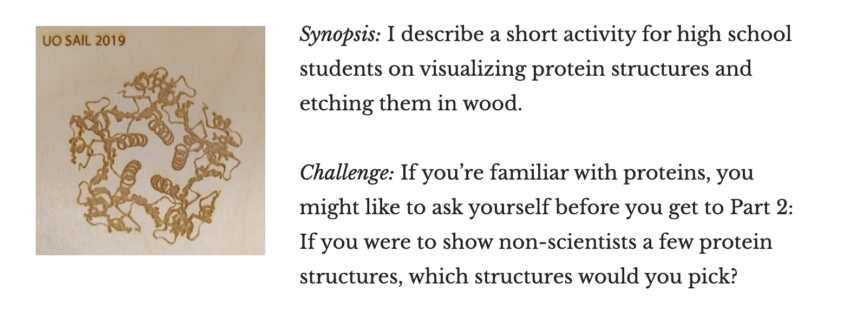From UO physicist Raghu Parthasarathy’s always interesting Eighteenth Elephant blog:
There are now no bookstores around the University of Oregon (UO) campus. Until recently, there were two. The two did not, however, go out of business — at least not in a straightforward way.
One of the stores is the University bookstore. At least since I moved to Eugene, 13 years ago, the uppermost of its three floors contained general books — fiction, nonfiction, children’s books — the full set you’d expect from a good small bookstore. A year or two ago — I can’t remember — books were relegated to the back third of the middle floor. Now, they have disappeared completely. One might worry that one can’t have a bookstore without books, by definition. There are still textbooks, however, and in any case it’s not technically the UO Bookstore, but rather the “Duckstore.” (Not that they have ducks.) My inability to remember the exact history of books at the campus bookstore is the main motivation for this post — documenting so that I (or anyone else) can look back at this later for a snapshot of the campus neighborhood in late 2019.
Raghu also has a post about the physics department’s work with SAIL students over the summer:
1. Background: SAIL
As in each of the past 12 years, I’ve co-run a one-week “SAIL” camp for high school students, targeting low-income students especially with a week of activities on the University of Oregon (UO) . I’ve written about this before (“The ice cream and the dead people”, “SAIL Recap 2017”), and our Physics + Human Physiology program hasn’t changed much in recent years. “If it ain’t broke, don’t fix it,” of course, and since students give rave reviews of the week, and those of us running it are happy with it as well, there’s no reason to make major alterations. (The Physics and Human Physiology parts of the camp are largely separate, but there are some connections we make between the two.) I’ll comment at the end of this post on some of the perennial favorite activities — Prof. Graham Kribs’ Physics of Climbing session, Prof. Eric Corwin’s liquid nitrogen ice cream, and time in the cadaver lab. Outside our camp, in the broader SAIL program, there’s lots of change — a steady expansion now to 16 camps serving about 400 students, and this year, for the first time, a small pilot residential program with some students staying in the UO dorms. (The goal of the residential program is to serve students from throughout the state, not just the Eugene-Springfield area.) Regarding outcomes, a considerably higher fraction of alumni of the summer and academic-year mentoring programs pursue post-secondary education than their peers. (I don’t have the numbers on me.)
There was one new activity in our Physics + Human Physiology camp this year, however, and that’s the subject of this post. A few weeks before the camp, I ended up with an extra hour in the SAIL program that I needed to fill. It’s not too hard to find volunteers, but the back-and-forth of scheduling, emailing, talking to people, etc. is tedious, and I decided that it would probably be more enjoyable and no less time-consuming to design and implement a new activity myself. (I wouldn’t have thought this ten years ago, but I have a lot more outreach and teaching experience now!) At the same time, Dean Walton, a science librarian, was thinking about doing something connected to a SAIL tour of UO’s student Makerspace, which he runs. (More on this in part 3.)

It was sad to see the decline f the UO Bookstore. I never liked the change to “Duckstore.” Still, the main problem was that fewer and fewer people were buying general market books. It’s easy to understand why the store threw in the towel.
Some of us old, old timers (from the nineties of the last century) remember fondly the UO Bookstore as a source for general books. It had strong collections in fiction, travel, cooking, and children’s literature–even a shelf for faculty authors where one could go and adjust the display. What do I buy there now? Stamps and monster cookies.
Re SAIL: It would be interesting to have some analysis of how well it is achieving its goals. I am told that poor success rates of minority science studenrs at UO is a great concern — though I have no data on this. UO is spending a ton of time, energy, and money on “diversity, equity, inclusion.” How is this working out? I do know one professor who claims to be getting positive results with black, Hispanic, and rural students in intro science without any “diversity” emphasis at all. Is he lying or is he on to something?
I am surprised that Smith Family has lasted this long. Their obstinate refusal to catalog their holdings, let alone acknowledge in any way the existence of computers and the internet, has frustrated me and other book-purchasers that I know for over two decades. I have wondered how they stay in business at all.
Me: “Do you have XXX by YYY?”
Smith Family: “I don’t know, go look in the ZZZ section, or maybe WWW.”
Me: [pulls out phone, opens powells.com…]
I’m still morning the loss of the Hungry Head bookstore on Willamette :-(
I’m still mourning the loss of Marketplace Books in the 5th St Public Market, lol! They were done in by changing times — Borders, not Amazon! Times change. Joseph Schumpeter called it “creative destruction.” It’s not entirely pretty. American university system, beware. I sometimes get the feeling they are living in a dream world.